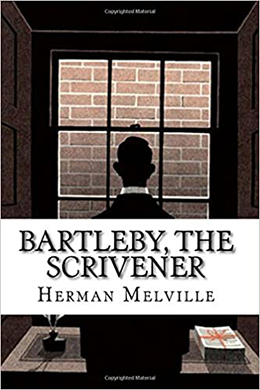

Surely the crisis of this story, the question of what constitutes basic humanity, is highlighted and made all the more poignant by its urban setting – by using the city, and in particular, the office, Melville shows us just how alone we can be, even when we're surrounded by other people. The humanistic theme, which ties one of lifes winners inextricably to the pathetic demise of a loser, relegates the two central characters to a single. We have to wonder if a story like this, in which human beings are profoundly alienated from each other, even though they interact all day, every day, would be possible in an alternate setting. Bartleby the Scrivener, A Tale of Wall Street What does Ah Bartleby, Ah humanity mean in the very last sentence of Bartleby the Scrivener The last words of Bartleby the Scrivener can be. It's notable that we don't learn anything about any of the characters beyond what they're like in the office, not even our narrator.

This impersonality of the characters is hugely significant – the business-based world in which they operate has no room for personal interaction, and, as a result, neither does Melville's story. Bartleby, The Scrivener 2 as apremature act inasmuch as I had counted upon a life-lease of the prots, whereas I only received those of a few short years. Both the narrator and Bartleby make choices that impact what happens to them in the present and the future.
BARTLEBY THE SCRIVENER THEME PROFESSIONAL
The story takes place in a law office populated by a set of odd men, whose relationships with each other seem to be purely professional in nature. In Herman Melville’s Bartleby, The Scrivener, the author implies the major theme as the choices made in our lives, impact how we live our life. In this reading, Bartleby’s resistance to his superiors is a heroic rebellion against society’s current structure. In this way, Bartleby comes to represent the power of passive resistance against capitalism. However, his choice not to comply with the rules of the workplace could be viewed as a rebellion against Wall Street materialism. Passive Resistance: Bartleby is not a conventionally heroic character. From the story Bartleby exhibits symptom of a deprived nature clearly. Some of the symptoms associated with it are persistent sad, anxious, or empty’ mood, loss of interest or pleasure in hobbies and activities appetite and/or weight changes (Baxter et al., 2014). Melville first published "Bartleby the Scrivener" in New York in 1853, when the young metropolis was already a booming center of commerce. Bartleby, the Scrivener: A Story of Wall Street. DepressionDepression is a disorder that is widely spread in today’s society. This story's setting is central to our understanding of what's going on here – the original subtitle, "A Story of Wall Street," makes it clear that we're supposed to take its location into account from the very beginning. A law office on Wall Street, New York City mid 19th century


 0 kommentar(er)
0 kommentar(er)
